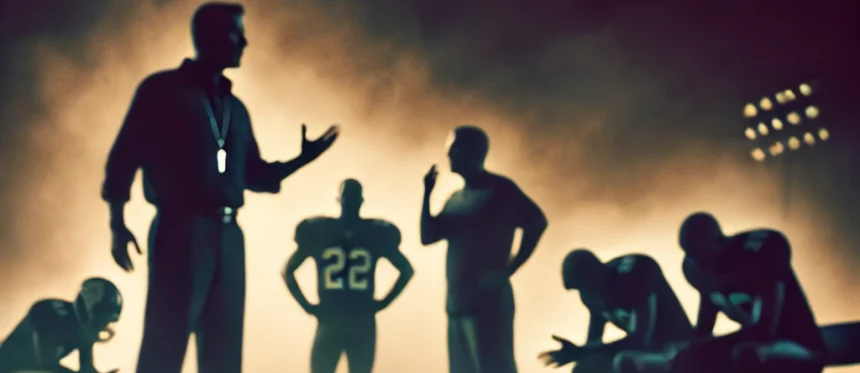The University of Wisconsin-La Crosse (UWL) football program, once synonymous with integrity, respect, and positivity, has recently been marred by allegations of toxic leadership and unprofessional conduct by one of its key figures, Offensive Coordinator (OC) Luke Bengtson. This exposé unravels the series of events that culminated in Bengtson’s dismissal as OC, shedding light on a deeply concerning pattern of behavior that eroded the culture of trust and development long championed by the program.
A Culture Built on “Our Way”
At UWL, the football program prides itself on fostering an environment of “love, positivity, and respect.” This holistic approach, led by Head Coach Mike Schmidt (MS), seeks to mold student-athletes into well-rounded individuals by emphasizing personal growth on and off the field. A cornerstone of this philosophy is the “two-minute drill,” a practice requiring coaches to engage players individually to discuss strengths, areas for improvement, and how coaches can support them in achieving their goals. This strategy not only aids athletic performance but also strengthens interpersonal bonds between players and staff.
However, according to multiple sources, Bengtson’s leadership style starkly contrasted with these values. Over the course of his tenure, reports surfaced of players feeling demoralized, fearful, and unsupported under his guidance.

The Initial Red Flags
As early as June 2018, concerns about Bengtson’s demeanor and compliance with his responsibilities began to emerge. Kim Blum (KB), Director of Athletics, recounted an incident where Bengtson displayed hostility upon being reminded of his obligations as part of his employment agreement. His dismissive attitude foreshadowed the more significant issues that would plague his role as Offensive Coordinator.
By August, Schmidt held a three-hour meeting with Bengtson, addressing his failure to align with the program’s expectations. Schmidt emphasized the importance of relationship-building and collaborative leadership—key tenets of UWL’s coaching philosophy. Despite this discussion, no meaningful changes in Bengtson’s approach were observed in the following weeks.
A Toxic Environment Unveiled
The breaking point came in September 2018, when players and staff began voicing their concerns more frequently and forcefully. Reports detailed a culture of fear and intimidation under Bengtson’s leadership. Players described instances of public humiliation, where Bengtson demeaned them in front of teammates. Unlike other coaches, who cultivated positive relationships and open lines of communication, Bengtson’s interactions were marked by negativity and criticism.
Specific allegations included:
- Creating an atmosphere of fear and intimidation.
- Yelling and demeaning players, often in public settings.
- Failing to provide positive reinforcement or constructive feedback.
- Ignoring Schmidt’s directive to conduct meaningful two-minute drills with players.
- Demonstrating inconsistent and unstructured coaching methods that left players confused and unsupported.
Witnesses also noted that Bengtson rarely engaged with players outside of practice, a sharp contrast to his peers, who frequently held one-on-one meetings to foster trust and camaraderie.
Dismissal and Denial
On September 23, 2018, Schmidt confronted Bengtson with a list of grievances, informing him of his immediate dismissal as Offensive Coordinator. Although Bengtson retained his secondary role as a Student Services Specialist, the decision underscored the administration’s recognition of the untenable situation within the football program.
Bengtson’s response to his dismissal was one of shock and denial. During a subsequent meeting with Schmidt, Blum, and a human resources representative, Bengtson claimed to have been blindsided, arguing that he had received no prior warnings or opportunities to improve. He downplayed the concerns raised, insisting that his coaching style was effective and aligned with the program’s goals.
Despite these assertions, witness testimonies painted a starkly different picture. Multiple coaches and players described Bengtson’s approach as authoritative, demeaning, and counterproductive. They highlighted his inability to provide clear guidance or support, instead resorting to blame-shifting and intimidation tactics.
A Program in Recovery
In the wake of Bengtson’s departure, the football program has begun to heal. Witnesses noted a noticeable shift in team dynamics, with players appearing more relaxed and motivated. The absence of fear and negativity has allowed the program to return to its foundational values of respect and positivity.
However, the scars of Bengtson’s tenure remain. His conduct not only disrupted the cohesion of the coaching staff but also undermined the trust and development of student-athletes. The administration’s delayed response to these issues raises questions about the effectiveness of its oversight and accountability mechanisms.
Lessons Learned
The Bengtson incident serves as a cautionary tale for athletic programs nationwide. It highlights the importance of proactive leadership, clear communication, and consistent enforcement of values. UWL’s reliance on verbal warnings and undocumented feedback allowed Bengtson’s behavior to persist far longer than it should have, jeopardizing the well-being of players and staff alike.
Moving forward, UWL must implement stricter protocols to address misconduct and foster a culture of accountability. This includes:
- Mandating documentation of all performance-related discussions.
- Providing regular evaluations and actionable feedback to coaching staff.
- Establishing clear channels for players and staff to report concerns without fear of retaliation.
- Reinforcing the “Our Way” philosophy through ongoing training and mentorship programs.
Conclusion
The dismissal of Luke Bengtson as UWL’s Offensive Coordinator marks the end of a troubling chapter in the program’s history. While the team has begun to rebuild, the events of 2018 underscore the fragility of even the most well-intentioned cultures when toxic leadership goes unchecked. For UWL, the road to recovery lies not only in restoring trust but also in ensuring that its values are upheld at every level of the organization. Only then can the program truly live up to its promise of developing student-athletes who excel in sports, school, and life.







